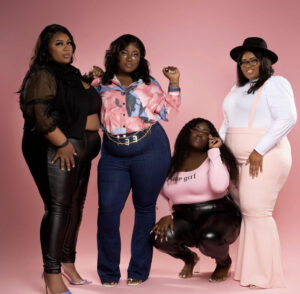
Fat shaming is in our brain in a way we aren’t even aware of. It might be as simple as scrolling on Instagram thinking, “Wow, she really shouldn’t be wearing that dress with thighs like that” or perhaps holding the opinion that ladies with larger arms are amazing in the kitchen.
Comments like, “she’s pretty for a plus-sized girl,” or “did you lose some weight? You look SO much better,” are incredibly problematic statements that reinforce the idea that either fatness and beauty are equivalent or that their size gives them a disadvantage of being considered beautiful.
In movies, big boned characters are frequently the villain or comedic relief. Rarely has a main character experienced a serious romantic relationship and let’s not get started on body discrimination in the fashion industry.
Thanks to social media people now have another platform to network, floss their achievements, and portray themselves as whoever they want to be. This leads to comparisons of how you should or shouldn’t look, as well as what is popular or accepted in society. This includes the standards of physical attractiveness placing a strong emphasis on thinness as the foundation of feminine beauty. Weight stigmatization may be a risk for women whose bodies stray, even a little, from physical beauty norms.
Fat-shaming remarks has worsened since users often conceal their unpleasant behavior behind the keyboard or their platform. Kanye West is one of many celebrities whose social media presence and platform spark debate.
The rapper used his “good friend” Lizzo as the focal point of a critique of the body-positive movement during an appearance on Fox News’ Tucker Carlson Tonight. He called the promotion of her weight “demonic” and compared it to a “genocide of the Black race,” along with abortion.
“Lizzo works with my trainer, a friend of mine, Harley Pasternak. When Lizzo loses 10 pounds and announces it, the bots – that’s a term, it’s like telemarketer callers – on Instagram, they attack her for losing weight because the media wants to put out a perception that being overweight is the new goal when it’s actually unhealthy,” Kanye said. “Let’s get aside from the fact whether it’s fashion and Vogue – which it’s not – or if someone thinks it’s attractive, to each his own. It’s actually clinically unhealthy. And for people to promote that, it’s demonic.”
It is not surprising to witness widespread weight stigmatization toward women, even if they are not “fat,” given that thinness standards have permeated our culture and are actively promoted by the media, yo mama so fat jokes, and the fashion industry. Weight discrimination has been linked to a variety of bad eating habits, including low self-esteem, sadness, anxiety, and a worsened body image in women.
Men might also be subjected to the stigma of being overweight. Jonah Hill, an actor, criticized the Daily Mail in February 2021 for publishing pictures of him without a shirt on. “I don’t think I ever took my shirt off in a pool until I was in my mid 30s even in front of family and friends. Probably would have happened sooner if my childhood insecurities weren’t exacerbated by years of public mockery about my body by press and interviewers.”
After hearing West’s comments on Lizzo, a member of Campus +, a plus-size organization on FAMU’s campus, says she was both “disappointed and tickled”.
“I felt very very disappointed, at the same time I found it very comical as well because I mean Kanye West literally has admitted to getting liposuction because he can’t control his weight and his mother died from a liposuction surgery that went wrong – that was very weird and funny,” the member said.
West is one of many that have participated in operations to remove fat, but does it still make them healthy if their eating and health routines stayed the same? Given that being overweight is most frequently characterized as being “unhealthy” and the result of overeating, this is a legitimate question.
A person’s character should be considered instead of their skin tone, what they eat, or the number of followers they have on social media. If not, keep in mind, to quote Rico Richie, “If you ain’t got no haters if you ain’t poppin.”